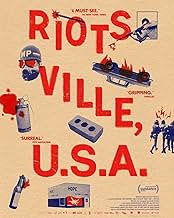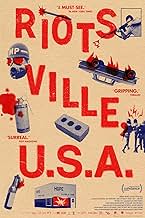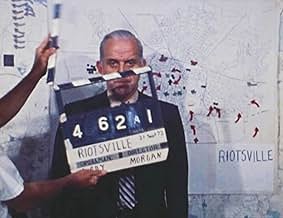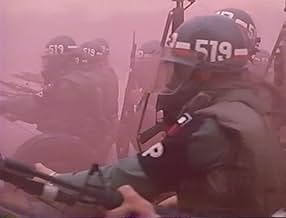Benvenuti a Riotsville, una città immaginaria costruita dall'esercito americano.Benvenuti a Riotsville, una città immaginaria costruita dall'esercito americano.Benvenuti a Riotsville, una città immaginaria costruita dall'esercito americano.
- Premi
- 4 vittorie e 10 candidature totali
Lyndon B. Johnson
- Self
- (filmato d'archivio)
Otto Kerner
- Self - Chairman
- (filmato d'archivio)
- (as Governor Otto Kerner)
Edward P. Morgan
- Self - PBL Chief Correspondent
- (filmato d'archivio)
Robert Curvin
- Self - Former Chairman, Neward CORE
- (filmato d'archivio)
Leonard Kowalewski
- Self - Newark Police
- (filmato d'archivio)
John Harrington
- Self - Fraternal Order of Police
- (filmato d'archivio)
- (as Sgt. John Harrington)
Albert Cleage
- Self
- (filmato d'archivio)
- (as The Rev. Albert Cleage)
Alvin F. Poussaint
- Self - Tufts University
- (filmato d'archivio)
- (as Dr. Albert Poussaint)
Fred Harris
- Self - Commission Member
- (filmato d'archivio)
- (as Sen. Fred R Harris)
Dick Gregory
- Self
- (filmato d'archivio)
Roger Mudd
- Self
- (filmato d'archivio)
Robert Byrd
- Self
- (audio di repertorio)
- (as Senator Robert Byrd)
Jimmy Collier
- Self
- (filmato d'archivio)
Frederick Douglass Kirkpatrick
- Self
- (filmato d'archivio)
- (as Rev. Frederick Douglass Kirkpatrick)
Ronald Reagan
- Self
- (filmato d'archivio)
Spiro Agnew
- Self
- (filmato d'archivio)
- (as Gov. Spiro Agnew)
Strom Thurmond
- Self
- (filmato d'archivio)
- (as Sen. Strom Thurmond)
Recensioni in evidenza
I was excited to see this documentary when I first heard about it and sought it out, but in the end it left me bored and annoyed.
The director has access to some remarkable file footage, but doesn't seem to know what to do with it. Interspersed with that amazing footage are a series of overly arty flashing collages of ambient video (a close up of TV pixels for several minutes) coupled with grinding tuneless soundscapes and a laughable voice over that sounds like a cross between a bad poetry slam and a hilarious satire of an overly earnest podcast, right down to the slow, labored delivery and over-pronunciation (Think the "You Must Remember This" podcast)
The director also made a weird choice to not have voice narration outside of the arty collages; instead she has chosen like a hundred title cards in black rectangles in the middle of the screen. It becomes annoying pretty quickly since the file footage is so jaw droppingly interesting.
So many bad choices directorially. With the footage they had, this should have been a gimme, instead it's like a high school film students senior project with a fairly dumbed-down historical take.
Come for file footage; be prepared to fast forward through the long, boring "podcast" segments.
The director has access to some remarkable file footage, but doesn't seem to know what to do with it. Interspersed with that amazing footage are a series of overly arty flashing collages of ambient video (a close up of TV pixels for several minutes) coupled with grinding tuneless soundscapes and a laughable voice over that sounds like a cross between a bad poetry slam and a hilarious satire of an overly earnest podcast, right down to the slow, labored delivery and over-pronunciation (Think the "You Must Remember This" podcast)
The director also made a weird choice to not have voice narration outside of the arty collages; instead she has chosen like a hundred title cards in black rectangles in the middle of the screen. It becomes annoying pretty quickly since the file footage is so jaw droppingly interesting.
So many bad choices directorially. With the footage they had, this should have been a gimme, instead it's like a high school film students senior project with a fairly dumbed-down historical take.
Come for file footage; be prepared to fast forward through the long, boring "podcast" segments.
The trailer for this movie focused on the fake towns - they look like movie sets - that were built in the 1960s so that the Army could practice dealing with "race riots."
As it turns out in the movie, there were only two such Riotsvilles, and they play only a very small roll in this movie. That's very unfortunate, imo. I would have liked to know how they were financed - did Congress know about them? - how the soldiers were chosen to stage crowd control in them, etc. In other words, I would have appreciated it if the movie had concentrated on the riotsvilles.
Instead, most of the movie deals with the Civil Rights Movement and white reaction to it in the 1960s. That's interesting, of course, but nothing new. Sometimes it really seemed like filler for a movie that should have been a short rather than a feature-length film.
The narration got a little shrill at times for my tastes. The images and newsreel footage that are the basis of this movie are already powerful, and speak for themselves Since no one opposed to the Civil Rights Movement is going to watch this movie, there's no point in preaching to the already converted.
An ok movie, in short, but not enough new material to warrant its 91 minute run time.
As it turns out in the movie, there were only two such Riotsvilles, and they play only a very small roll in this movie. That's very unfortunate, imo. I would have liked to know how they were financed - did Congress know about them? - how the soldiers were chosen to stage crowd control in them, etc. In other words, I would have appreciated it if the movie had concentrated on the riotsvilles.
Instead, most of the movie deals with the Civil Rights Movement and white reaction to it in the 1960s. That's interesting, of course, but nothing new. Sometimes it really seemed like filler for a movie that should have been a short rather than a feature-length film.
The narration got a little shrill at times for my tastes. The images and newsreel footage that are the basis of this movie are already powerful, and speak for themselves Since no one opposed to the Civil Rights Movement is going to watch this movie, there's no point in preaching to the already converted.
An ok movie, in short, but not enough new material to warrant its 91 minute run time.
This film struggles with some fascinating archival footage and trying to stretch both the length and message of the film too broadly around that.
This country struggles with civil rights sadly over and over again, now to the point where the one thing uniting far too many citizens is an unwavering distrust of the government. Documenting protests is important in understanding both the strength and vulnerability of the not-always-so-United States. That said I feel like any assembly of mobs...protesters (also I guess anti-protesters generally few but vociferous) and then the police force can bring out the mob mentality on both sides.
In general color me wary of both, but especially the ones where everyone in the mob has a gun.
Anyways this film might best be served by watching the trailer or a sped-up or excerpted version of it. I assume the abridged version won't have the slow zoom and defocus on pixelated faces. Although that would do a disservice to DJ Rupture's excellent soundtrack work.
Looking forward... 1) Well I do think for all of the struggles, the arc or the USA does bend towards a better country...often painfully and painfully slowly.
2) The notion of test cities for police exercises is still going on afaik, didn't the former Blackwater corporation utilize them recently before they re-branded or whatever?
3) Sierra Pettengill might be an excellent resource for gathering archival footage for other directors' projects. I see she was part of the team for the Jarmusch documentary on the The Stooges (with Iggy that is, not Curly).
I struggle to recommend this, but with expectations lowered for less of an expose and more of an art collage meditation with occasional Gulf advertisements - it might be worth an hour of your time, although the running time is 1.5 hours.
This country struggles with civil rights sadly over and over again, now to the point where the one thing uniting far too many citizens is an unwavering distrust of the government. Documenting protests is important in understanding both the strength and vulnerability of the not-always-so-United States. That said I feel like any assembly of mobs...protesters (also I guess anti-protesters generally few but vociferous) and then the police force can bring out the mob mentality on both sides.
In general color me wary of both, but especially the ones where everyone in the mob has a gun.
Anyways this film might best be served by watching the trailer or a sped-up or excerpted version of it. I assume the abridged version won't have the slow zoom and defocus on pixelated faces. Although that would do a disservice to DJ Rupture's excellent soundtrack work.
Looking forward... 1) Well I do think for all of the struggles, the arc or the USA does bend towards a better country...often painfully and painfully slowly.
2) The notion of test cities for police exercises is still going on afaik, didn't the former Blackwater corporation utilize them recently before they re-branded or whatever?
3) Sierra Pettengill might be an excellent resource for gathering archival footage for other directors' projects. I see she was part of the team for the Jarmusch documentary on the The Stooges (with Iggy that is, not Curly).
I struggle to recommend this, but with expectations lowered for less of an expose and more of an art collage meditation with occasional Gulf advertisements - it might be worth an hour of your time, although the running time is 1.5 hours.
Greetings again from the darkness. A couple of old sayings came to mind while watching this. "The more things change, the more they stay the same." This ties together what we see from the 1960's with what we've seen very recently in the U. S. Next would be, "You made your bed, now sleep in it." This references the manner in which our government reacted to civil unrest in the 1960s has affected our society for the past 50+ years.
Documentarian Sierra Pettingill utilizes only archival footage from TV (newscasts and talk shows) and military footage filmed during the era. The clips are edited in a way to tell the story of how the government responded to increased civil unrest, and how those responses not only made the situation worse, it also set the table for ongoing societal issues for decades to come.
Historical background includes President Lyndon Johnson forming the Kerner Commission (officially The National Advisory Commission on Civil Disorders), and how the resulting 700 page 1968 report did not provide the conclusions expected by the government. It warned of two societies - one white, one black, separate and unequal. The corresponding action items were deemed too expensive due to the ongoing Vietnam War. Instead an addendum suggested expanded federal funding for police ... that one hit home with politicians.
Much of the footage, as well as the film's title, comes from the model town constructed by the military at Fort Belvoir in Virginia. It's here where training sessions occurred with military personnel cast as rioters and law enforcement learned the approaches to quell the uprising. Unfortunately, most of these approaches involved law enforcement escalation during civil unrest, leaving us wondering which causes the most damage. We even see military leaders observing the drills from the grandstands, applauding and laughing in some parts. It's impossible not to notice that these are all white faces.
Further escalation and federal funding resulted in specialty tanks, and we see the training videos around this weapon. At its core, what we see is a simulated riot in a simulated city. It's easy to view this as training hate and power, rather than learning de-escalation techniques. Director Pettingill also includes clips from PBL (precursor to PBS) talk shows like "Civil Disorder". These shows, and their debates, caused Ford Motor Company to withdraw funding in 1969. The news clips from the 1968 Democrat and Republican conventions provide some insight into the reporting during this era. Especially biting is David Brinkley's response to Strom Thurmond's comments. The film's only weakness comes in the form of narration from Charlene Modeste. The words are simply too flowery or artsy for such subject matter. This is a film that urges you to feel the frustrations. It turns out "Law & Order" can be twisted by those in power.
Releasing in theaters and OnDemand beginning September 16, 2022.
Documentarian Sierra Pettingill utilizes only archival footage from TV (newscasts and talk shows) and military footage filmed during the era. The clips are edited in a way to tell the story of how the government responded to increased civil unrest, and how those responses not only made the situation worse, it also set the table for ongoing societal issues for decades to come.
Historical background includes President Lyndon Johnson forming the Kerner Commission (officially The National Advisory Commission on Civil Disorders), and how the resulting 700 page 1968 report did not provide the conclusions expected by the government. It warned of two societies - one white, one black, separate and unequal. The corresponding action items were deemed too expensive due to the ongoing Vietnam War. Instead an addendum suggested expanded federal funding for police ... that one hit home with politicians.
Much of the footage, as well as the film's title, comes from the model town constructed by the military at Fort Belvoir in Virginia. It's here where training sessions occurred with military personnel cast as rioters and law enforcement learned the approaches to quell the uprising. Unfortunately, most of these approaches involved law enforcement escalation during civil unrest, leaving us wondering which causes the most damage. We even see military leaders observing the drills from the grandstands, applauding and laughing in some parts. It's impossible not to notice that these are all white faces.
Further escalation and federal funding resulted in specialty tanks, and we see the training videos around this weapon. At its core, what we see is a simulated riot in a simulated city. It's easy to view this as training hate and power, rather than learning de-escalation techniques. Director Pettingill also includes clips from PBL (precursor to PBS) talk shows like "Civil Disorder". These shows, and their debates, caused Ford Motor Company to withdraw funding in 1969. The news clips from the 1968 Democrat and Republican conventions provide some insight into the reporting during this era. Especially biting is David Brinkley's response to Strom Thurmond's comments. The film's only weakness comes in the form of narration from Charlene Modeste. The words are simply too flowery or artsy for such subject matter. This is a film that urges you to feel the frustrations. It turns out "Law & Order" can be twisted by those in power.
Releasing in theaters and OnDemand beginning September 16, 2022.
An in depth review of the true nature of police escalation during civil unrest. All of which is remains painfully relevant even to this day.
I was able to view this during the virtual Sundance Festival.
The blatant and heavily institutionalized discrimination that exists from of birth of police is well displayed throughout this film.
It's unfortunate that this is still a problem today.
Only critique is the editing did feel a bit choppy intermixed with the quotes. Maybe could use another round of editing before wide distribution.
I was able to view this during the virtual Sundance Festival.
The blatant and heavily institutionalized discrimination that exists from of birth of police is well displayed throughout this film.
It's unfortunate that this is still a problem today.
Only critique is the editing did feel a bit choppy intermixed with the quotes. Maybe could use another round of editing before wide distribution.
I più visti
Accedi per valutare e creare un elenco di titoli salvati per ottenere consigli personalizzati
- How long is Riotsville, U.S.A.?Powered by Alexa
Dettagli
Botteghino
- Lordo Stati Uniti e Canada
- 40.960 USD
- Fine settimana di apertura Stati Uniti e Canada
- 5597 USD
- 18 set 2022
- Lordo in tutto il mondo
- 44.392 USD
- Tempo di esecuzione1 ora 31 minuti
- Colore
Contribuisci a questa pagina
Suggerisci una modifica o aggiungi i contenuti mancanti

























